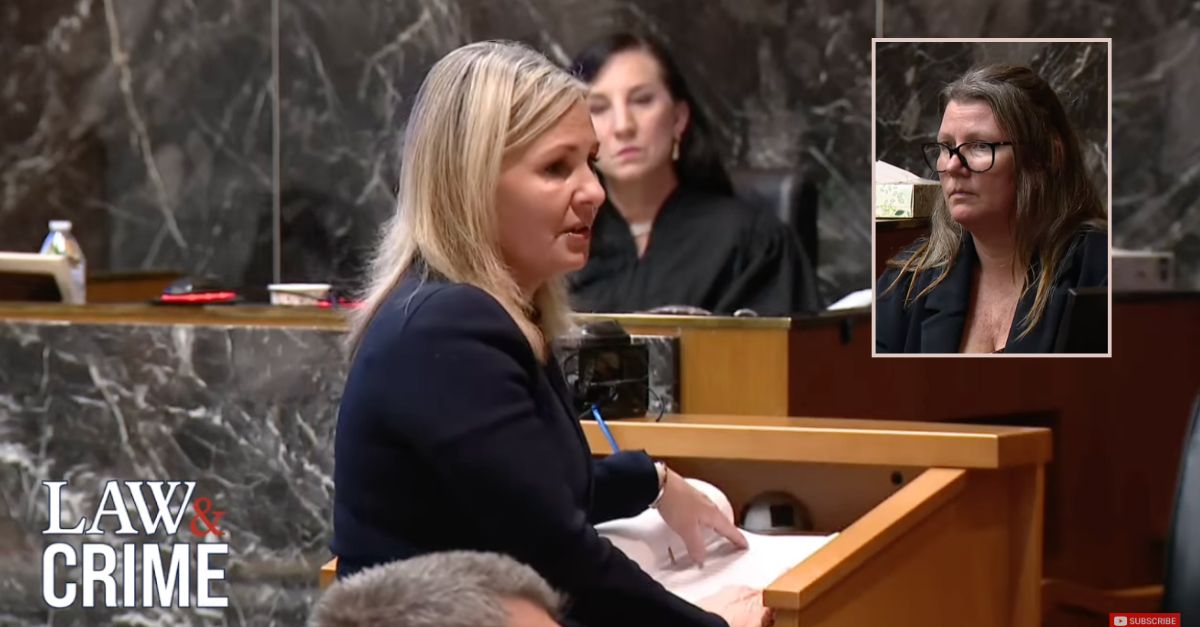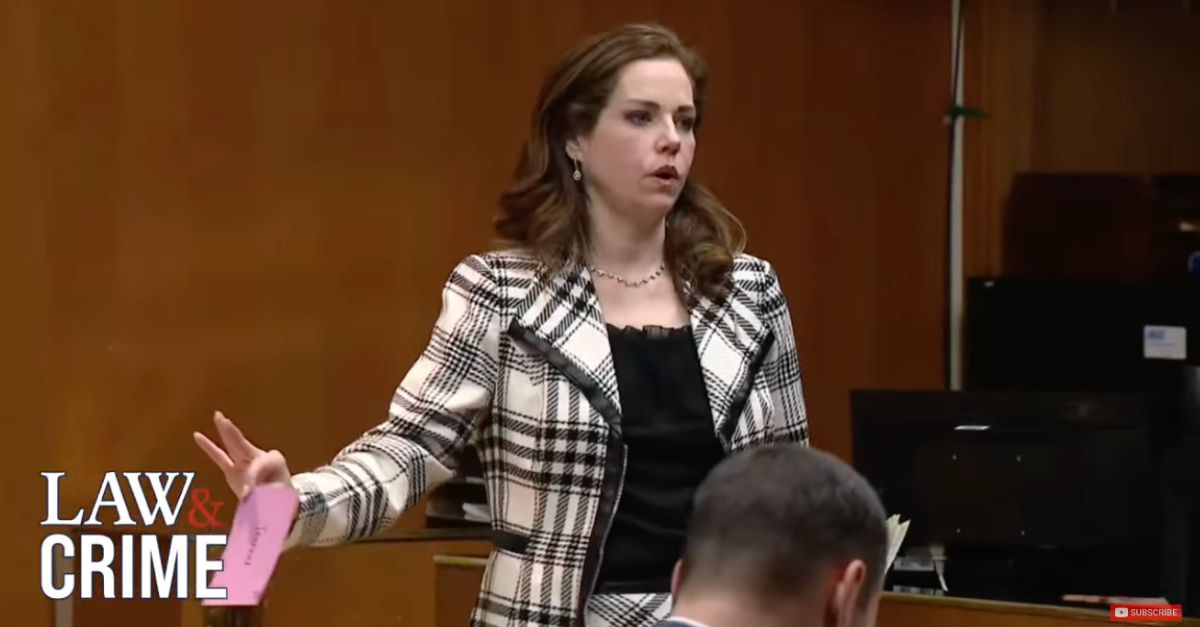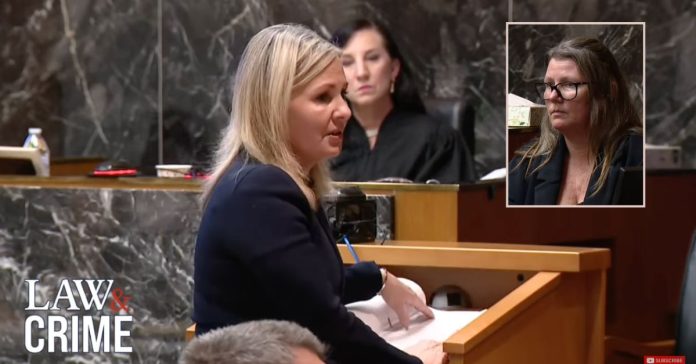
Oakland County prosecutor Karen McDonald gives closing arguments in the manslaughter prosecution of Jennifer Crumbley, mother of Oxford High School shooter Ethan Crumbley, as Oakland County Circuit Judge Cheryl Matthews looks on. Inset: Jennifer Crumbley testifies under cross-examination from prosecutors. (Screengrabs via Law&Crime.)
The groundbreaking case against a mother whose son killed four teenagers during a horrific school shooting has gone to the jury.
Jennifer Crumbley is facing manslaughter charges in the deaths of Tate Myre, 16, Hana St. Juliana, 14, Madisyn Baldwin, 17, and Justin Shilling, 17, who were killed when her son, Ethan Crumbley, then 15, opened fire on his classmates on Nov. 30, 2021. According to prosecutors, Jennifer Crumbley was the last person to be in possession of the weapon her son used to carry out the attack — a handgun she had described on social media as her son’s Christmas present days prior. They also alleged that she didn’t take reasonable steps to stop the rampage and find care for her son.
According to prosecutors, however, the Crumbleys knew their son was troubled — and had been called to the school the day of the shooting after teachers discovered disturbing and violent drawings he had made in a math workbook. The parents ultimately left the school after meeting with school officials and their son, while Ethan Crumbley stayed behind.
Arrest warrants were issued for Jennifer Crumbley and James Crumbley, her husband and Ethan Crumbley’s father, who is also charged with manslaughter, after the shooting. They appeared to have attempted to evade apprehension by the police but were eventually found hiding in a building near downtown Detroit, around 30 minutes away from Oakland.
In closing arguments on Friday, prosecutors told jurors that it would not have taken much for Jennifer Crumbley to stop her son from carrying out the shooting.
“Ordinary care [means] what [is] the tragically smallest thing she could have done to prevent this?” Oakland County prosecutor Karen McDonald asked the jury before offering several examples. “Stopped at home on the way back from the meeting [at her son’s school] to see where the gone was. [But she] drove right by her house. She could have stopped by after her meeting. She could have locked the gun. She could have taken him home. She could have taken him to work. He could have gone with his dad — he was DoorDashing.”
McDonald also told jurors that Jennifer Crumbley withheld crucial information from school officials who had called her to a meeting that tragic day after discovering disturbing drawings on Ethan Crumbley’s schoolwork.
“She could have told the school that they just gifted him a gun,” McDonald said. “She could have embraced her son. She could have said can we talk to him for a minute alone. She could have looked at him, said ‘I care about you, I love you.’ She could have at least acknowledged him in the room.”
“Ordinary care would have included all of those things,” the prosecutor also said. “And the tragic part about it is none of it was hard. None of it. The smallest thing, just the smallest thing could have saved Hana, Tate, Justin, and Madisyn. The smallest of things.”
She also told jurors that they could consider Jennifer Crumbley’s actions in the days following the shooting — in which she and her husband took steps to “avoid detection” by withdrawing cash from their bank accounts as well as their son’s, powering down their cellphones, and eventually took refuge in an art studio, where they were ultimately apprehended — can be seen as “consciousness of guilt.”
“Where is their son during this time?” McDonald asked the jurors before answering the question herself. “He’s at Children’s Village, being arraigned, with his court-appointed lawyer, where they had opportunity to go see him. They had opportunity to go to that arraignment, and they did not.” Instead, McDonald said, the Crumbleys ran.
McDonald emphasized Jennifer Crumbley’s communications in the hours and days after the shooting, including deleting messages from her phone, arranging for care of her horses, and sending a text to her boss asking him not to judge her for her son’s actions and pleading to keep her job.
“Why is a mother whose son just killed four people thinking about deleting her text messages?” McDonald said. “Why is she saying things that are not true about her son? Why does she care about her job? Why does she care about her horse medicine? Why does she care about any of those things?”
“She wants you to believe she is somebody she’s not,” McDonald continued. “You know what she’s not? She is not somebody who used ordinary care to prevent something that was reasonably foreseeable that could result in injury or death. And it did.”
McDonald said that the shooter’s journal entries — including a drawing of a person with bullet holes and blood coming out of their head, which Jennifer Crumbley testified she thought actually depicted a “cape” — should have tipped the defendant off to the potential of violence.
“Writing it on a piece of paper and showing it to her,” McDonald said. “That is foreseeability.”
McDonald also reminded jurors that Jennifer Crumbley had testified that the gun used in the attack was locked with a cable that came with the gun case, but evidence showed that the lock had never been opened and never been used. She also said that the defendant was the last known person to be in possession of the handgun.
“This is the last picture we have of the gun before it is used as a murder weapon,” McDonald said, showing security footage of Jennifer Crumbley walking with the gun case. The prosecutor told jurors that the footage undermines Jennifer Crumbley’s testimony that the gun wasn’t her responsibility but that it was up to her husband to keep it safe.
McDonald brought jurors back to the meeting Jennifer and James Crumbley had with their son at the school hours before the deadly shooting, telling them that she hardly acknowledged her son or even engaged with him before leaving the meeting and going back to work.
“During the meeting, Jennifer Crumbley didn’t greet her son,” McDonald said. “Jennifer Crumbley didn’t hug her son. Jennifer Crumbley didn’t engage with her son the entire 11 minutes she was there.”
“She walked out of that school, when just the smallest, smallest of things could have saved, could have helped Hana and Tate and Madisyn and Justin,” McDonald later said. “Just the smallest of things. And not only did she not do it, but she doesn’t even regret it.”
McDonald acknowledged that charging a parent for the deadly actions of their child is unusual but warranted in this situation.
“It’s a rare case that takes some really egregious facts,” the prosecutor said. “It takes the unthinkable. She has done the unthinkable. And because of that, four kids have died.”

Jennifer Crumbley’s attorney, Shannon Smith, gives closing arguments in defense of her client, who is facing manslaughter charges in connection with her son Ethan Crumbley’s deadly attack at Oxford High School (via Law&Crime).
Jennifer Crumbley’s defense lawyer, Shannon Smith, said her client had no reason to believe her son would have done what he did, drawing on the prosecutor’s use of the word “unthinkable.”
“As the prosecutor finished, she said this is shocking, unthinkable,” Smith said. “Unbelievable, unthinkable, unfathomable. And the reason that’s the case is because it was unforeseeable. No one expected this. No one could have expected this. Including Mrs. Crumbley.”
Calling the case “a very dangerous case for parents out there,” Smith said that her client’s texts about her son — including telling a friend he was an “oopsie baby” and “weird” — are nothing out of the ordinary. She cited her own texts to her husband describing their daughter as a “psycho” and a “nutcase” and said that without context, it appears that she doesn’t care about her children’s mental health.
Jennifer Crumbley’s lack of response to some of her son’s texts, in other words, was just one example of relatable parenting.
“I also got a text one day,” Smith continued. “‘We have no food in our house, I am absolutely starving, you are the worst mother ever.’ You know what I did? I ignored it. She was mad we didn’t have the right kind of chicken ramen … when we have four other flavors of ramen and there’s about 100 other things she could eat, and I know she’s not going to starve to death, taken out of context, it makes me look like a neglectful mother. But if you know all the circumstances and you know the relationship I have with my daughter, I knew it was an overdramatic, stupid point.”
“I’m surprised Jennifer Crumbley doesn’t have more texts about her son acting like a typical teenager,” she also said.
Smith said the blame for the teens’ deaths falls on only one person: Ethan Crumbley.
“The Crumbleys’ son was a skilled manipulator, and they didn’t realize it,” Smith said. “He’s not sick. He doesn’t have a mental illness. He’s had no history of hallucinations. He has never shown his parents signs of mental illness. He certainly never showed signs of mental illness wanting to get a gun. No parent would purchase a weapon if they believed their child had mental illnesses.”
Smith referred to her client as a “hyper-vigilant” parent, citing Jennifer Crumbley’s treatment of her son’s medical issues, including headaches, cavities, and even an abnormal mole on his back.
“She pays more attention to those kinds of things than I do,” she said, motioning to her client sitting at the defense table. “I could very easily be sitting in that chair.”
Ethan Crumbley, now 17, pleaded guilty in October to all 24 charges against him, including murder and terrorism. He was sentenced to a lifetime in prison without the possibility of parole.
James Crumbley’s trial is set to begin in March.
Have a tip we should know? [email protected]

